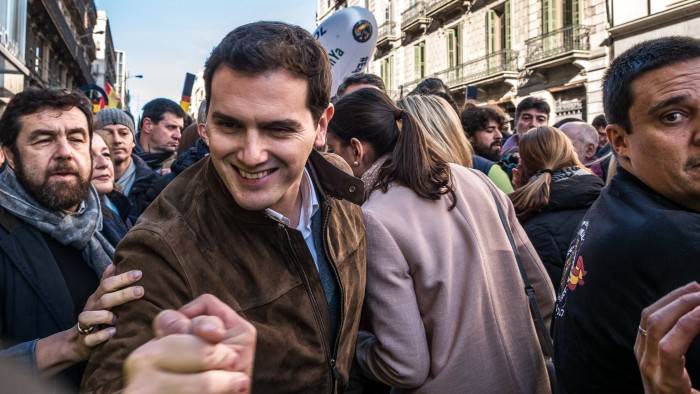Five years ago Albert Rivera, a lawyer in his mid-30s, was head of a small regional Catalan party set up to counter the local independence movement.
Today his Ciudadanos is — at least according to some polls — the most popular party in all of Spain, emerging as one of the political winners from the chaos of the recent Catalan independence push.
The elections are not due until 2020, but if Ciudadanos maintains its momentum the development would represent a step-change in a political system dominated by the ruling Popular Party (PP) and opposition Socialists since Spain’s return to democracy 40 years ago.
One recent poll by Metroscopia put Ciudadanos at 27 per cent of the popular vote, about five points ahead of the two traditional parties and a big jump from 16 per cent last March.
Sitting in his office in Madrid, a confident Mr Rivera seems anything but shocked by his party’s rise. Ciudadanos, he says, is just the Spanish version of a wider international phenomenon, in which he says the traditional parties of the left and right are being challenged by new centrist liberal groups.
“This is happening all over Europe, all over the world,” he says. “In France it was Emmanuel Macron, in Canada it was Justin Trudeau . . . Ciudadanos is doing the same thing for Spain.”
Mr Rivera is upbeat about the prospects for the progressive liberal parties, which he says have proven themselves the best choice for addressing the key issue of the age: the fight against nationalism, populism and protectionism.
“The worldwide trend is that liberalism is giving a better battle to populism and nationalism than conservatives and socialists are,” he says.
Ciudadanos was founded in 2006 with a focus on opposing rising Catalan nationalism. Mr Rivera, a former competitive swimmer, was appointed its first leader.
The party started competing nationally in 2014, carving out a niche as a centrist and progressive liberal party with a vision for Spain that was pro-markets, socially liberal, anti-corruption and pro-Europe.
It had some early successes, winning 14 per cent of the vote in the 2015 elections, although it was eclipsed by Spain’s other new party, the far-left Podemos, which won 21 per cent.
But in recent months Podemos has been losing support, while many polls show Ciudadanos has reached new heights.
This is at least in part because the party benefited from
the Catalan independence push, in which the region’s leaders last October held an illegal referendum on secession from Spain and then declared an independent republic,
Madrid quickly saw off the threat, firing the regional government and taking control of regional institutions. In the furore, Ciudadanos managed to establish itself in the public imagination as the most fierce and uncompromising voice defending Spanish unity — winning over many voters.
“Catalonia has been a trigger for us,” says Mr Rivera, who criticises the separatists for bringing “economic ruin” to the region, “dividing Catalan society in two” and “ignoring the law of the Spanish constitution”.
Rivera’s short path to political prominence

- 1979 — Born in Barcelona
- 1997 — Studied law at Barcelona’s ESADE university
- 2002 — Worked in the legal team at Spanish bank La Caixa
- 2006 — Appointed head of Ciudadanos
- 2012 — Leads Ciudadanos to take 8 per cent in Catalan elections
- 2015 — Becomes national lawmaker
Not all polls put Ciudadanos ahead nationally — a CIS survey on Monday showed it in third place. But in recent months several have it in the lead and all show it to be on the rise.
It is enough to worry the PP. Mariano Rajoy, prime minister, this month attacked Ciudadanos as a party of opportunists with no “clear ideas” about any issue who are “constantly revising their principles”.
The PP was annihilated in the regional Catalan elections in December, while the local branch of Ciudadanos won its best ever result, becoming the largest political party in the region.
But Ciudadanos’ recent success nationally might prove just a short-term bump powered by the Catalonia chaos rather than a structural change in Spain, analysts say.
“There is no real tradition of a liberal, centrist party in Spain,” says Jorge Galindo, political analyst and editor of the Politikon blog. “Maybe they have created one from scratch, and it’s growing, but maybe it’s more about Catalonia.”
Mr Rivera counters that while the events in Catalonia are important, this is mostly because they have made people realise that combating nationalism and populism is a key political question — and that Ciudadanos has answers.
The issue will not go away, he says: “The left and right axis has been overcome, diluted, by the new debates of globalisation, protectionism, liberalism and equality . . . that is the debate of the 21st century.
“I think we can win the next election,” he adds. “But at the very least in the future in Spain, politics will be a battle between the conservative right, the socialist left and the liberal centre . . . we can all see that.”
